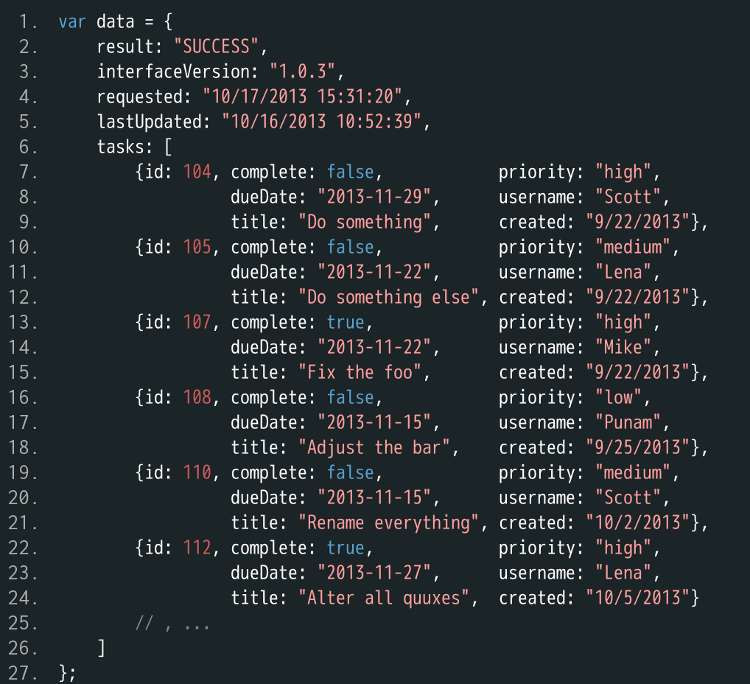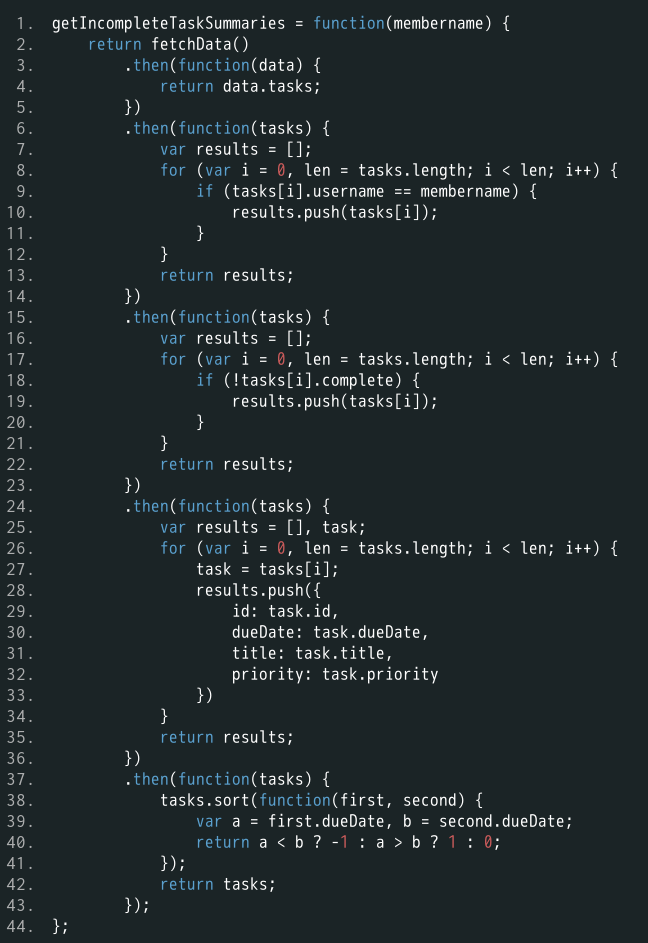JavaScript 函数式编程解析(上)
一些必要的概念
纯函数(Pure Function)
Pure function 意指相同的输入,永远会得到相同的输出,而且没有任何显著的副作用。
纯函数就是数学里的函数,这也是函数式编程的全部。
副作用
副作用是在计算结果的过程中,系统状态的一种改变,或是外部世界可观察的交互作用。
副作用可以包含,但不限于:
更改文件系统
在资料库写入纪录
发送一个 http 请求
状态变化
打印到屏幕/ log
DOM 查询
存取系统状态
概括来说,任何 function 与外部环境的交互都是副作用。
柯里化(curry)
使用更少的参数调用一个函数,返回一个接受剩余参数的函数。举例如下:
const add = x => y => x + y;
const increment = add(1);
const addTen = add(10);
increment(2); // 3
addTen(2); // 12
函数式编程的优势
确定性(可预测性、数据不可变),同样的输入必然得到相同的输出可以使用数学定律
// 结合律(associative)
add(add(x, y), z) === add(x, add(y, z));
// 交换律(commutative)
add(x, y) === add(y, x);
// 同一律(identity)
add(x, 0) === x;
// 分配律(distributive)
multiply(x, add(y,z)) === add(multiply(x, y), multiply(x, z));
函数式编程的适用场景
可变状态(mutable state) 不受限的副作用(unrestricted side effects) 无原则设计(unprincipled design)
函数是一等公民的意义
在 JavaScript 中,函数是一等公民,它意味着函数就跟其他任何数据类型一样,并没有什么特殊之处——可以存储在数组中,作为函数的参数传递、赋值给变量,等等。作为“一等公民”,函数的意义至少有如下几点:
有助于减少不必要的重构
// 如果renderPost功能发生变化,必须改变包装函数
httpGet('/post/2', json => renderPost(json));
// 例如增加一个err
httpGet('/post/2', (json, err) => renderPost(json, err));
// 如果我们把它写成一个一等公民函数,那么就不需要变了
httpGet('/post/2', renderPost);
有助于增加通用性和可重用性
// 专门为特定的功能准备
const validArticles = articles =>
articles.filter(article => article !== null && article !== undefined),
// 看上去有无限的通用性和可重用性
const compact = xs => xs.filter(x => x !== null && x !== undefined);
不需要使用 this,但是需要注意适配外部API
const fs = require('fs');
// scary
fs.readFile('freaky_friday.txt', Db.save);
// less so
fs.readFile('freaky_friday.txt', Db.save.bind(Db));
纯函数的价值
可缓存
const memoize = (f) => {
const cache = {};
return (...args) => {
const argStr = JSON.stringify(args);
cache[argStr] = cache[argStr] || f(...args);
return cache[argStr];
};
};
const squareNumber = memoize(x => x * x);
squareNumber(4); // 16
squareNumber(4); // 16, 返回输入4的缓存结果
可移植性/自文档化(Portable / Self-documenting)
// impure
const signUp = (attrs) => {
const user = saveUser(attrs);
welcomeUser(user);
};
// pure
const signUp = (Db, Email, attrs) => () => {
const user = saveUser(Db, attrs);
welcomeUser(Email, user);
};
纯函数把所有可能改变输出的变量Db和Email,都作为函数签名,这样我们就能知道函数是做什么的,依赖什么参数——提供了更多的信息。可移植性是 JS 的一个强大特性,函数会通过 socket 序列化并传输,意味着在 web worker 中我们可以运行所有代码。
可测试的(Testable):利用特性,只需要给出输入和断言的输出即可。 可推理的(Reasonable):同理 并行代码(Parallel Code):由于不需要共享内存,所以可以并行处理纯函数
柯里化(Currying)
// curry :: ((a, b, ...) -> c) -> a -> b -> ... -> c
function curry(fn) {
const arity = fn.length;
return function $curry(...args) {
if (args.length < arity) {
return $curry.bind(null, ...args);
}
return fn.call(null, ...args);
};
}
const match = curry((what, s) => s.match(what));
const replace = curry((what, replacement, s) => s.replace(what, replacement));
const filter = curry((f, xs) => xs.filter(f));
const map = curry((f, xs) => xs.map(f));
通过以上的柯里化函数,我们可以把函数式编程变得简洁,没有冗余。尽管有多个参数,我们仍然可以保留数学函数的定义。
match(/r/g, 'hello world'); // [ 'r' ]
const hasLetterR = match(/r/g); // x => x.match(/r/g)
hasLetterR('hello world'); // [ 'r' ]
hasLetterR('just j and s and t etc'); // null
filter(hasLetterR, ['rock and roll', 'smooth jazz']); // ['rock and roll']
const removeStringsWithoutRs = filter(hasLetterR); // xs => xs.filter(x => x.match(/r/g))
removeStringsWithoutRs(['rock and roll', 'smooth jazz', 'drum circle']); // ['rock and roll', 'drum circle']
const noVowels = replace(/[aeiou]/ig); // (r,x) => x.replace(/[aeiou]/ig, r)
const censored = noVowels('*'); // x => x.replace(/[aeiou]/ig, '*')
censored('Chocolate Rain'); // 'Ch*c*l*t* R**n'
组合(Composing)
Composing 就是把函数像“管道”一样组合起来。下面展示最简单的组合示例。
const composes = (f, g) => x => f(g(x));
const toUpperCase = x => x.toUpperCase();
const exclaim = x => `${x}!`;
const shout = compose(exclaim, toUpperCase);
shout('send in the clowns'); // "SEND IN THE CLOWNS!"
以下是一个通用的 compose 函数:
const compose = (...fns) => (...args) => fns.reduceRight((res, fn) => [fn.call(null, ...res)], args)[0];
因为 compose 也是纯函数,同样满足分配律:
// 满足分配律
compose(f, compose(g, h)) === compose(compose(f, g), h);
所以不管传参的顺序如何,它都返回相同的结果,非常强大 👍
const arg = ['jumpkick', 'roundhouse', 'uppercut'];
const lastUpper = compose(toUpperCase, head, reverse);
const loudLastUpper = compose(exclaim, toUpperCase, head, reverse);
lastUpper(arg); // 'UPPERCUT'
loudLastUpper(arg); // 'UPPERCUT!'
Pointfree 风格
Pointfree 的意思是不使用所要操作的数据,只合成运算过程。下面是使用Ramda[1]函数库的pipe方法实现 Pointfree 的例子,选自阮一峰老师的《Pointfree 编程风格指南》[2]。
var str = 'Lorem ipsum dolor sit amet consectetur adipiscing elit';
上面字符串最长的单词有多少个字符呢?先定义一些基本运算:
// 以空格分割单词
var splitBySpace = s => s.split(' ');
// 每个单词的长度
var getLength = w => w.length;
// 词的数组转换成长度的数组
var getLengthArr = arr => R.map(getLength, arr);
// 返回较大的数字
var getBiggerNumber = (a, b) => a > b ? a : b;
// 返回最大的一个数字
var findBiggestNumber = arr => R.reduce(getBiggerNumber, 0, arr);
然后把基本运算合成为一个函数:
var getLongestWordLength = R.pipe(
splitBySpace,
getLengthArr,
findBiggestNumber
);
getLongestWordLength(str) // 11
可以看到,整个运算由三个步骤构成,每个步骤都有语义化的名称,非常的清晰。这就是 Pointfree 风格的优势。Ramda 提供了很多现成的方法,可以直接使用这些方法,省得自己定义一些常用函数(查看完整代码[3])。
// 上面代码的另一种写法
var getLongestWordLength = R.pipe(
R.split(' '),
R.map(R.length),
R.reduce(R.max, 0)
);
再看一个实战的例子,拷贝自 Scott Sauyet 的文章《Favoring Curry》[4]。那篇文章能帮助你深入理解柯里化,强烈推荐阅读。下面是一段服务器返回的 JSON 数据。 现在要求是,找到用户 Scott 的所有未完成任务,并按到期日期升序排列。
现在要求是,找到用户 Scott 的所有未完成任务,并按到期日期升序排列。 过程式编程的代码如下(查看完整代码[5])。
过程式编程的代码如下(查看完整代码[5])。 上面代码不易读,出错的可能性很大。现在使用 Pointfree 风格改写(查看完整代码[6])。
上面代码不易读,出错的可能性很大。现在使用 Pointfree 风格改写(查看完整代码[6])。
const getIncompleteTaskSummaries = (name) => {
return fetchData()
.then(R.prop('tasks'))
.then(R.filter(R.propEq('username', name)))
.then(R.reject(R.propEq('complete', true)))
.then(R.map(R.pick(['id', 'dueDate', 'title', 'priority'])))
.then(R.sortBy(R.prop('dueDate')))
}
上面代码就变得清晰很多了。
常用 Pointfree 纯函数的实现
下面的实现仅仅为了基本演示,如果考虑实际开发,请参考ramda[7],lodash[8], 或folktale[9]。
// curry :: ((a, b, ...) -> c) -> a -> b -> ... -> c
function curry(fn) {
const arity = fn.length;
return function $curry(...args) {
if (args.length < arity) {
return $curry.bind(null, ...args);
}
return fn.call(null, ...args);
};
}
// compose :: ((y -> z), (x -> y), ..., (a -> b)) -> a -> z
const compose = (...fns) => (...args) => fns.reduceRight((res, fn) => [fn.call(null, ...res)], args)[0];
// forEach :: (a -> ()) -> [a] -> ()
const forEach = curry((fn, xs) => xs.forEach(fn));
// map :: Functor f => (a -> b) -> f a -> f b
const map = curry((fn, f) => f.map(fn));
// reduce :: (b -> a -> b) -> b -> [a] -> b
const reduce = curry((fn, zero, xs) => xs.reduce(fn, zero));
// replace :: RegExp -> String -> String -> String
const replace = curry((re, rpl, str) => str.replace(re, rpl));
// sortBy :: Ord b => (a -> b) -> [a] -> [a]
const sortBy = curry((fn, xs) => xs.sort((a, b) => {
if (fn(a) === fn(b)) {
return 0;
}
return fn(a) > fn(b) ? 1 : -1;
}));
// prop :: String -> Object -> a
const prop = curry((p, obj) => obj[p]);
关于更多 Pointfree 纯函数的实现可以参考Pointfree Utilities[10]。
参考
《Professor Frisby’s Mostly Adequate Guide to Functional Programming》[11],翻译版本为《JS 函数式编程指南中文版》[12]
Pointfree Javascript[13]
Favoring Curry[14]
参考资料
Ramda: http://www.ruanyifeng.com/blog/2017/03/ramda.html
[2]《Pointfree 编程风格指南》: http://www.ruanyifeng.com/blog/2017/03/pointfree.html
[3]完整代码: http://jsbin.com/vutoxis/edit?js,console
[4]《Favoring Curry》: http://fr.umio.us/favoring-curry/
[5]完整代码: http://jsbin.com/kiqequ/edit?js,console
[6]完整代码: https://jsbin.com/dokajarilo/1/edit?js,console
[7]ramda: https://ramdajs.com/
[8]lodash: https://lodash.com/
[9]folktale: http://folktale.origamitower.com/
[10]Pointfree Utilities: https://mostly-adequate.gitbook.io/mostly-adequate-guide/appendix_c
[11]《Professor Frisby’s Mostly Adequate Guide to Functional Programming》: https://github.com/MostlyAdequate/mostly-adequate-guide
[12]《JS 函数式编程指南中文版》: https://jigsawye.gitbooks.io/mostly-adequate-guide/content/SUMMARY.md
[13]Pointfree Javascript: http://lucasmreis.github.io/blog/pointfree-javascript/
[14]Favoring Curry: http://fr.umio.us/favoring-curry/
